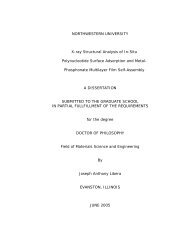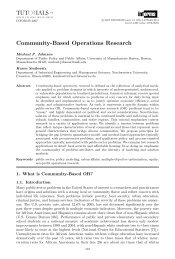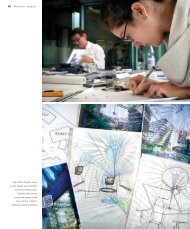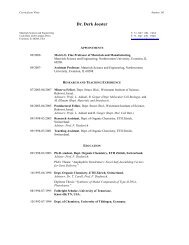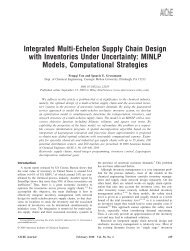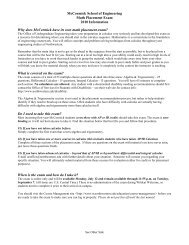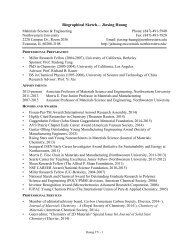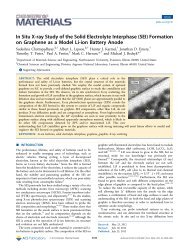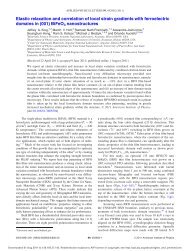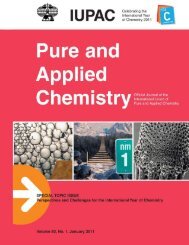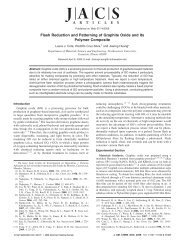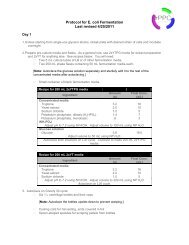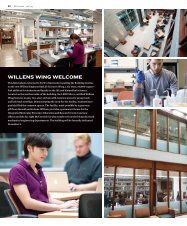McCormick School of Engineering and Applied Science ...
McCormick School of Engineering and Applied Science ...
McCormick School of Engineering and Applied Science ...
Create successful ePaper yourself
Turn your PDF publications into a flip-book with our unique Google optimized e-Paper software.
Northwestern UniversityM c Cormick 2005-2006Robert R. <strong>McCormick</strong><strong>School</strong> <strong>of</strong> <strong>Engineering</strong><strong>and</strong> <strong>Applied</strong> <strong>Science</strong>sFaculty <strong>and</strong> Advisor H<strong>and</strong>book
Northwestern UniversityM c CormickRobert R. <strong>McCormick</strong><strong>School</strong> <strong>of</strong> <strong>Engineering</strong><strong>and</strong> <strong>Applied</strong> <strong>Science</strong>sAdvising <strong>and</strong> Registration Schedule 2005-2006 Academic YearDates To Remember For Fall 2005-2006 Registration ProcessFall Final Schedule on CAESAR* Tuesday, August 23Freshman Advisers Briefing Monday, Sept. 12Freshman Advising Thursday, Sept. 16Freshman Registration Friday, Sept. 17Late Registration/Add or Change Period Tuesday, Sept. 20 - Monday, Sept. 26P/N Declaration Period Tuesday, Sept. 20 - Friday, Oct. 7Drop PeriodTuesday, Sept. 20 - Friday, Oct. 28 (5:00pm)Dates To Remember For Winter 2005-2006 Registration ProcessWinter qtr. Schedule on CAESAR* Friday, Oct. 28Winter qtr. Advisers’ Quarterly Workshop Thursday, Oct. 20Winter qtr. Advising Sign-up Wednesday, Oct. 26 - Friday, Oct. 28Winter quarter Advising Monday, Oct. 31 – Friday Nov. 4Study Plans Due Friday, Nov. 4Winter Quarter Registration Dates Monday, Nov 14 – Friday, Nov. 18(CAESAR open until Dec. 16)Late Registration/ Add or Change Period Tuesday, Jan 3 – Monday, Jan. 9P/N Declaration Period Tuesday, Jan 3- Friday, Jan. 20Drop PeriodTuesday, Jan 3 - Friday, Feb 10 (5:00pm)Dates To Remember For Spring 2005-2006 Registration ProcessSpring qtr. Advisers’ Quarterly Workshop Thursday, Jan. 26Spring qtr. Schedule on CAESAR* Friday, Feb. 3Spring qtr. Advising Sign-up Wednesday, Feb. 1 – Friday, Feb. 3Spring quarter Advising Monday, Feb. 6 – Friday, Feb. 10Study Plans Due Friday, Feb. 10Spring Quarter Registration Dates Monday, Feb. 20 - Friday, Feb. 24(CAESAR open until March 17)Late Registration/Add or Change Period Monday, March 27 - Friday, March 31P/N Declaration Period Monday, March 27 - Friday, April 14Drop Period Monday, March 27 - Friday, May 5Dates To Remember For Fall Quarter 2006-2007 Registration ProcessFall qtr. Advisers’ Quarterly Workshop Thursday, April 27Fall qtr. Schedule on CAESAR* Friday, April 28Fall quarter Advising Sign-up Wednesday, April 26 – Friday, April 28Fall quarter Advising Monday, May 1 – Friday, May 5Study Plans Due Friday, May 5Fall Quarter Registration Dates Monday, May 15 - Friday, May 19(CAESAR open until Friday, Sept.8)
TABLE OF CONTENTSPAGEI. COURSESA. Notes on Course Management: Reminders, Suggestions <strong>and</strong> Cautions 4B. Class Lists 4C. Classroom Scheduling Room Reservations (Smart Classroom Information) 5D. Mid-Quarter Deficiency Report 7E. Reading Period 7F. CTEC - Course & Teacher Evaluation 7G. Regular Examinations, Make-up Examination 8H. Grades 8I. Final Grade, Online Access Authorization Form <strong>and</strong> on-line grading instructions 9J. Change <strong>of</strong> Grade 12K. Academic Discipline 13L. Academic Integrity: Faculty Responsibilities 14M. Check <strong>of</strong>f/Degree Audit Insert, Sample Check-<strong>of</strong>f <strong>and</strong> Key Sheet 14II. STUDENT ADVISINGA. Faculty Advising <strong>of</strong> Undergraduates 17B. ABET Requirement 17C. Themes <strong>and</strong> Communication Requirement 17D. Registration <strong>and</strong> Advising – Study Plan Holds 18E. <strong>McCormick</strong> <strong>School</strong> Recognition for Advanced Placement Testing <strong>and</strong> International 18Baccalaureate TestingF. Signatures on P-N Slips 20G. Signatures on Drop <strong>and</strong> Add Slips – Permission Numbers 20H. Study Abroad 20I. Transfer Credits From Other Institutions 20J. Two BS Degrees 20K. Concurrent BS/MS Degrees 20L. P-N Grade Option 21M. Undergraduate (Departmental) Honor Programs 22N. Military <strong>Science</strong> Program Credits 24O. Access to Students’ Records: Rights <strong>and</strong> Responsibilities 24P. Faculty Guide in Assisting Students with Disabilities 27Q. Undergraduate Residence Requirements 28R. Advisor Evaluation by Students 29S. Information on the World Wide Web 30III. INDEX 313
COURSESA. NOTES ON COURSE MANAGEMENT: REMINDERS, SUGGESTIONS, AND CAUTIONS1. Make course plans known to students by providing the following at the beginning <strong>of</strong> the quarter:a. Course outlineb. Homework requirementc. Testing (providing some feedback before drop date)2. After the drop date, do not suggest or advise dropping the course, since by faculty-adopted policythis is not allowed except in case <strong>of</strong> unusual extenuation.3. In arriving at the final grade be extremely careful to avoid error. You will be held to the gradedecision you submit to the Registrar.4. A final examination is ordinarily given in a course. It should only be at the time scheduled by theRegistrar’s key or in those times scheduled for common or departmental exams that are pre-arrangedwith the Registrar <strong>and</strong> published in the Time Schedule.5. University policy as stated in the Faculty H<strong>and</strong>book should be followed.“Graded examinations <strong>and</strong> papers should be provided for student inspection <strong>and</strong> discussionwith the instructor. The faculty member is responsible for all work carried out by teachingassistants. During the quarter tests <strong>and</strong> quizzes should be graded <strong>and</strong> returned promptly inorder to make the examination a part <strong>of</strong> the students’ learning experience. Reasonableopportunity shall be provided for students to review final examinations <strong>and</strong> papers with theirinstructors during a period <strong>of</strong> at least two weeks in the subsequent quarter. During this periodinstructors normally retain students’ papers <strong>and</strong> answers to examination questions. In order toverify grades recorded by the Registrar <strong>and</strong> to answer possible inquiries, instructors’ gradebooks shall be retained for at least one year.”6. Please see the section on academic dishonesty <strong>and</strong> the attending precautions in section L.B. CLASS LISTSInstructors can access on-line class lists from the web using the following instructions:1. Go to http://www.registrar.northwestern.edu/2. Click on “Faculty <strong>and</strong> Staff”3. Scroll down to “Registration” heading, click on “Class Roster”4. Choose your net-id <strong>and</strong> password5. Click on “Search for a class”6. Select “Term” <strong>and</strong> enter the course number without a hyphen7. Click “Search classes” – select your class from the listAfter step 7 you will see the links to class lists, e-mail an a few others. If you have problems, contactSuzanne Anderson or Jaci Rivera in the Registrar’s Office.4
C. CLASSROOM SCHEDULING AND ROOM RESERVATIONSClassrooms in The Technological Institute building are part <strong>of</strong> the University-wide classroom systemunder the jurisdiction <strong>of</strong> the Registrar’s Office. <strong>Engineering</strong>, science <strong>and</strong> math courses receive a firstpriority, not a guarantee, in tech classrooms scheduling. Some classes will be assigned outside <strong>of</strong> theTech building.Classes must follow the guidelines listed below.MWF Classes1. MWF is the normal sequence for classes meeting three days a week for 50 minutes.2. MTWF is the normal sequence for classes meeting four days a week for 50 minutes.TTH Classes1. Classes should be scheduled to meet at 8:00, 9:30, 11:00, 12:30, 2:00 <strong>and</strong> 3:30 since mostTTH classes are 80 minutes.Additional Guidelines1. It is expected that a department’s classes in a given quarter should be balanced overdifferent time slots.2. The Registrar’s Office reserves the right to ask a department to change the time <strong>of</strong>classes as room scheduling difficulties warrant.3. All classes are assigned in accordance with past enrollments, unless justification ispresented that the enrollment will increase to match the maximum enrollment requested.4. All classes needing a specific classroom because <strong>of</strong> room facilities must complete aspecific room request through their department. Without a request, your room will beassigned by size.5. All requests to cancel or change the time <strong>of</strong> a class with students enrolled must bepresented in writing <strong>and</strong> singed by the chair <strong>of</strong> the department <strong>and</strong> rests uponauthorization <strong>of</strong> the dean <strong>of</strong> the school.Room ReservationsClassroom reservations for all buildings on campus, Quarterly assignments <strong>and</strong> one-time reservationsare h<strong>and</strong>led by Anca Borsan, at 7-7866 <strong>and</strong> Maria Di Benedetto, at 1-8438, in the Registrar’s Office.The summer session <strong>of</strong>fice, at (312) 503-2399, h<strong>and</strong>les all room reservations during the summermonths.Special Request for Room AssignmentsIf an instructor has specific needs for teaching her/his class, including location, classroom type (fixedseats, movable seats), particular buildings or particular classroom, <strong>and</strong> those with special audiovisualequipment or computers, all request must be done on an Excel spread sheet <strong>and</strong> sent via e-mail to j-rivera@northwestern.edu each quarter by the faculty or staff member in his/her department who isresponsible for classroom scheduling. This form must be absolutely complete <strong>and</strong> specific. It isnot sufficient to request a “Smart” room.5
Computer-Aided ClassroomsThe university has multiple high-tech classrooms with computer-aided equipment, AV equipment <strong>and</strong>projectors installed in the rooms. Facilities in each room are different. While many <strong>of</strong> these classroomsare in Tech the rooms are in high dem<strong>and</strong>, <strong>and</strong> faculty must be willing to teach out <strong>of</strong> Tech in order tohave to proper equipment for their class. It is the faculty member’s responsibility to know exactly whichrooms on campus will provide the necessary teaching facilities by using the Smart ClassroomsReference Table at the bottom <strong>of</strong> this page. Not all smart classrooms requested are available at thefaculty member’s choice <strong>of</strong> time <strong>and</strong> location, so faculty must be flexible.Tech Classrooms: Every room in Tech has a blackboard or whiteboard <strong>and</strong> overhead projector.Visit www.at.northwestern.edu/ctg/classrooms <strong>and</strong> select classroom list for more up to dateinformation.Smart Classrooms, also called technology-enhanced classrooms, create new opportunities in teaching<strong>and</strong> learning by integrating networking, digital, <strong>and</strong> audiovisual technologies. There are 46, Registrarschedule Smart Classrooms on the Evanston campus for faculty use. Seventeen (17) <strong>of</strong> these areLaptop-based* Smart classrooms. NUIT’s Academic Technologies supports the technology in theserooms <strong>and</strong> encourages you to contact us at 7-ROOM (7-7666) to schedule an orientation to learn moreabout these classroom facilities.The Office <strong>of</strong> the Registrar schedules these, <strong>and</strong> all classrooms for use.Smart classrooms are equipped with the following:• Ceiling mounted LCD projector <strong>and</strong> projection screen• Laptop connectivity for both Macintosh & PC• VCR• Sound system• Wireless mouse• Touch screen Control System• Telephone• Aux-video Input• USB InputDepending on the classroom, other equipment may include:• Resident networked Mac or/<strong>and</strong> PC w/DVD <strong>and</strong> Zip Drive*(over 30 s<strong>of</strong>tware titles available)• Microphone (wireless h<strong>and</strong>held <strong>and</strong> /or lavaliere)• Slide projector• Stereo Sound• Cassette Player• DVD player• Document Reader*Special Note* Because there is not resident computer in the laptop-based Classrooms, we encourageyou to bring your own laptop with you for training.6
D. MID-QUARTER DEFICIENCY REPORTUnsatisfactory course work by a student should be reported promptly to the Undergraduate <strong>Engineering</strong>Office. Deficiencies should be reported no later than the fifth week <strong>of</strong> the quarter. As soon as thesereports are received, the student is notified <strong>of</strong> the deficiency <strong>and</strong> asked to see her/his advisor. It ishoped that the student will thus have a fair <strong>and</strong> timely warning <strong>and</strong> that they will discuss with a facultymember the means <strong>of</strong> rectifying their difficulties. Please report excessive absences, or e-mail AssistantDean Joe Holtgreive at jjh@northwestern.edu.E. READING PERIODIn several schools <strong>of</strong> the university, including the Weinberg College <strong>of</strong> Arts <strong>and</strong> <strong>Science</strong>s, the last week<strong>of</strong> scheduled classes is designated as a “reading period” <strong>and</strong> no class meetings are actually held, thetime being given to reading, writing <strong>and</strong> review. In <strong>McCormick</strong>, however, no portion <strong>of</strong> the academicquarter is scheduled as a reading period. That is, the full quarter to the last day <strong>of</strong> scheduled classes isto be use for class meetings or appropriate assignments. However, <strong>McCormick</strong> observes the followingthree restrictions:1. There should be no new (additional) material in a course after Wednesday <strong>of</strong> Reading Week,the last week <strong>of</strong> classes.2. Final Examinations are not to be given before the end <strong>of</strong> the last week <strong>of</strong> classes.3. Other than in the case <strong>of</strong> a paper or project report in lieu <strong>of</strong> a final examination, the deadline forall materials to be submitted for a grade normally must be set no later than 5:00 PM <strong>of</strong> theSaturday preceding the final exam week.F. CTEC-COURSE & TEACHER EVALUATIONThe Course <strong>and</strong> Teacher Evaluation Council (CTEC) functions within the Office <strong>of</strong> the UniversityRegistrar. CTEC began as a student government committee in 1971 <strong>and</strong> currently operates under thedirection <strong>of</strong> the Provost’s Office. CTEC evaluates undergraduate <strong>and</strong> 400-level graduate courses <strong>and</strong>place a compilation <strong>of</strong> these undergraduate courses evaluations on the university web-sight with theinstructor’s permission.It is a <strong>McCormick</strong> policy that all courses participate in the CTEC process.The purposes <strong>of</strong> CTEC are three-fold:1. To give students the opportunity to make informed registration decisions about classes <strong>and</strong>instructors;2. To give faculty members feedback regarding which aspects <strong>of</strong> their teaching are successful <strong>and</strong>to determine which need improvement;3. To assist University administrators in making decisions regarding faculty promotions <strong>and</strong> tenure.Students fill out their CTEC course evaluations on-line via CAESAR.• Students may access the CTEC online page from several sites.www.registrar.northwestern.edu/www.registrar.northwestern.edu/ctec/www.northwestern.edu/academics• Students will be asked for their netid (abc123) <strong>and</strong> password (same as you e-mail) to enter thesite. Students will only be allowed to enter the sites <strong>of</strong> classes for which they are registered.• Once an evaluation is submitted for a class, the link to that class will be closed. Identificationwill not be linked in any way.• Remind them to do this evaluation.7
G. REGULAR EXAMINATIONSRegular final course examinations are held during the last week <strong>of</strong> each quarter, i.e., in the weekfollowing the last scheduled class (refer to the front <strong>of</strong> the Class Schedule). THERE SHOULD BE NODEVIATION FORM THIS EXAMINATION SCHEDULE.Make-up examinationsWhen a student has missed a final examination, a grade <strong>of</strong> “X” is assigned rather than a normal lettergrade. To remove the notation <strong>of</strong> “X”, which provides no credit for the student <strong>and</strong> carries zero points(the same as an F), the student must take a make-up examination. PERMISSION TO TAKE A MAKE-UP EXAM FOR AN ENGINEERING COURSE MUST HAVE THE WRITTEN APPROVAL OF BOTHTHE INSTRUCTOR AND THE ASSOCIATE DEAN. Unless the student is able to demonstrate that theabsence was due to extenuating circumstances beyond personal control (verification performed by theOffice <strong>of</strong> the Associate Dean for Undergraduate <strong>Engineering</strong>) permission to take a make-upexamination will not be granted <strong>and</strong> final grade in the course would reflect this fact. Make-upexaminations are normally scheduled within the first month <strong>of</strong> the quarter following the on in which the“X” was given. In all cases, “X” grades must be made up before the end <strong>of</strong> the next quarter in which thestudent is in residence in any school at Northwestern University or the credit if forfeited.H. GRADES<strong>McCormick</strong> faculty have the option <strong>of</strong> using "+" <strong>and</strong> "-" with the normal grades that have been used inthe past, as follows:Grade Grade Points JudgmentA 4 .0 ExcellentA- 3.7B+ 3.3B 3.0 GoodB- 2.7C+ 2.3C 2.0 SatisfactoryC- 1.7D 1.0 Poor but passingF 0 FailX 0 Failed to earn credit: missed final examinationY 0 Failed to earn credit: work incompleteThe following notations are not computed in the grade point average:P - Pass with creditN - No grade, no creditK - In progressS - Satisfactory: noncredit courseU - Unsatisfactory: noncredit courseW - Dropped course with permission8
I. FINAL GRADE AND ONLINE GRADINGIn arriving at a FINAL GRADE, be extremely careful to avoid clerical <strong>and</strong> judgment errors, <strong>and</strong> beprepared to hold to the grade decision.a. Opportunities for grades must be equal for all students, therefore, extra work orreexamination is not appropriate for use in determining a grade (or change <strong>of</strong> grade)unless these steps are regular policy in the course, made known <strong>and</strong> available to allstudents. In particular after a final grade is assigned, discussion or consideration <strong>of</strong>make-up work or reexamination should be avoided, since University policy will not allowa grade change on this basis.b. Any error in grading, an error <strong>of</strong> commission or omission, must be corrected <strong>and</strong> is theonly basis for changing a final course grade. In such a case, a memo (detailing thenature <strong>of</strong> the error <strong>and</strong> why it would necessitate a change in grade) must be submitted tothe Undergraduate Committee for approval. See section J.Be sure to use the following grades correctly:YKIncomplete: This grade may be used by the instructor only when, for verified or verifiableextenuating reasons, a student cannot complete the normal requirements <strong>of</strong> the course by thegrading deadline. An incomplete is appropriate only in cases in which the student hasparticipated to the fullest extent possible, developing considerable investment in the course, <strong>and</strong>is not appropriate in a situation in which the course would need to be essentially repeated at alater time.Work in Progress: Awarded only in those courses for which prior approval has been obtainedfrom the Dean’s Office. Individuals in unapproved course should receive a “Y”.XAbsent from the final examP/NP Pass/No Pass: Only grades “P” <strong>and</strong> “N” are acceptable entrances on the grade sheet,although the pr<strong>of</strong>essor should be able to support the assignment <strong>of</strong> the P or N.S/US Satisfactory or Unsatisfactory in a zero credit course. Only the grades “S” <strong>and</strong> “U” should beassigned.V/WAudit “V” is normally assigned. If you wish to deny the courtesy <strong>of</strong> an audit due to nonattendance,enter a grade <strong>of</strong> “W”.The FINAL ON LINE-GRADE LIST is available each term from the beginning <strong>of</strong> exam week until3:00pm on the Monday after exams. After 3 PM, grades cannot be entered online <strong>and</strong> must be doneon paper in the Office <strong>of</strong> the Registrar by the pr<strong>of</strong>essor.In order to enter grades on line all faculty teaching a course must complete the “Access AuthorizationForm”, this form can be obtained on line through the registrars’ website atwww.registrar.northwestern.edu/staffac/. If you have any questions regarding these procedures, pleasecontact the Associate Registrar, Michael Maysilles, at 1-8466. After the examination, week ends,grades must be submitted within two <strong>and</strong> one-half days.9
Access Authorization Form for Online Grade ProcessingRobert R. <strong>McCormick</strong> <strong>School</strong> <strong>of</strong> <strong>Engineering</strong> <strong>and</strong> <strong>Applied</strong> <strong>Science</strong>Name_____________________________________Date________________________________(Last Name, First Name, MI)E-mail ____________________________________Department __________________________Work Address ______________________________Work Ph ____________________________Netid _____________________________________EmplID _____________________________The individual listed above performs the departmental responsibilities related to submission <strong>of</strong> end <strong>of</strong> term grades<strong>and</strong> will require access to online grade processing.Statement <strong>of</strong> Agreement• I will not seek personal benefit or permit others to benefit personally from information contained in the StudentEnterprise System (SES).• The privacy <strong>and</strong> confidentiality <strong>of</strong> the student records is protected by The Family Educational Rights <strong>and</strong> PrivacyAct. Access to student records is granted to University staff/faculty who have a legitimate educational purpose. Itis unlawful to release student record information to any third party.• I will not divulge the contents <strong>of</strong> any record or report to any person except in the conduct <strong>of</strong> my work assignment<strong>and</strong> in accordance with University <strong>and</strong> department policies.• I will not knowingly include or cause to be included in any record or report a false, inaccurate, or misleadingentry.• I will not divulge personal ID’s or passwords to anyone, whether University personnel or others.I UNDERSTAND THAT ANY VIOLATION OF THIS AGREEMENT MAY BE CAUSE FOR APPROPRIATEDISCIPLINARY ACTION, INCLUDING DISMISSAL.Applicant’s SignatureStephen H. Carr, Associate DeanApplicant’s Printed NameFOR OFFICE USE ONLYData Custodian ______________________________Date ______________________________________Return completed form to the Office <strong>of</strong> the Registrar,Attention: Michael E. MaysillesFax (847) 491-845810
Online Grading Tip Sheet – see http://www.registrar.northwestern.edu/faculty_<strong>and</strong>_staff/onlgradts.pdf11
Solving the Most Common Grade Problems:1. THE STUDENT IS ATTENDING CLASS, BUT IS NOT ON THE GRADE ROSTERIf possible notify the student in writing that they do not appear on the roster <strong>of</strong> students in yourclass. If the course has concluded, a Change <strong>of</strong> Grade form will have to be used to record theirgrade.2. THE STUDENT IS NOT ATTENDING CLASS, BUT APPEARS ON THE GRADE ROSTERAssign an “F” grade <strong>and</strong> email Oralia Gomez ( o-gomez@northwestern.edu) in the Office <strong>of</strong> theRegistrar, indicating that the, “student never attended” or “stopped coming to class after the firstweek”. This notation will assist the Registrar’s Office when settling potential discrepancies.J. CHANGE OF GRADEThe Change <strong>of</strong> Grade form below is used for the following purposes:1. To report a final grade previously reported as incomplete (i.e., X or Y)2. To report a grade for a student whose name does not appear on the class list3. To report a letter grade change for approval by the Undergraduate Committee.Faculty members may obtain change <strong>of</strong> grade forms in the Undergraduate <strong>Engineering</strong> Office <strong>and</strong> thefaculty must have a signature card on file. Students must not be involved in delivering blank orcompleted Change <strong>of</strong> Grade forms. Faculty <strong>and</strong> Staff members will be asked to sign them out <strong>and</strong>record how many <strong>and</strong> which forms are in their possession.It is University policy that end <strong>of</strong>-quarter grades (except K, X or Y) are FINAL once submitted to theRegistrar’s Office <strong>and</strong> CANNOT BE CHANGED ON THE BASIS OF A REVISION OF JUDGMENT ORA SECOND OR EXTENDED OPPORTUNITY.Changes should be made to correct an actual error in grade computation or in transcribing a grade, orwhere some part <strong>of</strong> the student’s work has been unintentionally overlooked. The change is anecessary one if the new grade is one that would have been submitted had there been no mistake incomputing <strong>and</strong> had all the pertinent data been before the instructor at the end <strong>of</strong> the quarter.12
The <strong>McCormick</strong> Undergraduate Committee must approve every change from one letter grade toanother. Therefore, not only must the above Grade Report Form be presented, but it must beaccompanied by a written memor<strong>and</strong>um <strong>and</strong> appropriate documentation fully explaining thebasis for the change <strong>and</strong> how the error would result in a change <strong>of</strong> grade. The report form,memor<strong>and</strong>um, <strong>and</strong> documentation should be provided to the Associate Dean for referral to theUndergraduate Committee.All grade changes for Undergraduates must pass through the Undergraduate <strong>Engineering</strong> Office beforebeing sent to the Registrar’s Office. All grade changes for graduate students must pass through theGraduate <strong>School</strong> before going to the Registrar’s Office, except for MEM, MCM, MME <strong>and</strong> MMMstudents, whose cases are h<strong>and</strong>led through Dean Walsh’s <strong>of</strong>fice before going on to the Registrar’sOffice.K. ACADEMIC DISCIPLINEJurisdictionAcademic discipline <strong>and</strong> the need to respond to plagiarism, cheating in class, etc. are the responsibility<strong>of</strong> the undergraduate school that is <strong>of</strong>fering the course in which the incident occurred. An exception tothis jurisdictional arrangement is in the case <strong>of</strong> graduate students in these classes, they being underthe jurisdiction <strong>of</strong> the Graduate <strong>School</strong>. In instances where an undergraduate student enrolled inanother school is accused <strong>of</strong> having committed an act <strong>of</strong> academic dishonesty in a <strong>McCormick</strong> course,<strong>McCormick</strong> determines whether such an act took place <strong>and</strong> the effect, if any, on the <strong>McCormick</strong> coursegrade. The school in which the student is enrolled makes any sanction beyond a course grade.Similarly, a <strong>McCormick</strong> student found to have committed academic dishonesty in a course <strong>of</strong> anotherschool is referred to <strong>McCormick</strong> for determination <strong>of</strong> a further sanction, if any. http://wwwue<strong>of</strong>fice.tech.northwestern.edu/academic/integrity.cfmProceduresIf an instructor believes there may have been an act <strong>of</strong> academic dishonesty, the instructor mustimmediately refer the matter to the Associate Dean for Undergraduate <strong>Engineering</strong> (or, in the case <strong>of</strong> agraduate student, to the Graduate <strong>School</strong>). The instructor should not attempt to deal with the matterpersonally <strong>and</strong> should avoid interviewing the student or students involved. This part <strong>of</strong> the processshould be left to the Associate Dean.All cases shall be referred within one month <strong>of</strong> the date <strong>of</strong> the alleged incident or within one month <strong>of</strong>the date the faculty member becomes aware <strong>of</strong> it, whichever is later. No action shall be taken on anycase if more than one year has elapsed since the alleged incident. In the case <strong>of</strong> an undergraduate,the instructor should make a recommendation as to how the incident might affect the student’s grade orst<strong>and</strong>ing in the class.The Associate Dean meets with the student to gather information, to hear any explanation <strong>and</strong>determine what the sanction will be. The Associate Dean notifies the student in writing <strong>of</strong> her/hisdecision <strong>and</strong> informs the student <strong>of</strong> the appeals procedure.If the matter is appealed, it is referred to the Academic Hearing Board, <strong>and</strong> a first meeting is called withavailable evidence placed before the Board. The instructor <strong>and</strong> the student are asked to meet with theBoard, as well as any parties who may have been involved or may serve as witnesses. A request bythe Board, the instructor, or the student for further information or testimony will be honored <strong>and</strong>pursued.13
With all evidence developed as fully a possible, a final hearing is held with full opportunity to the student<strong>and</strong> the instructor to clarify charges <strong>and</strong> provide response. The Board will then make itsrecommendation, which may range from dismissing the charges exclusion from Northwestern. TheBoard, through its chair, shall inform the student that he or she may appeal the Board’s decision byfiling a further appeal in writing within ten days to the Provost <strong>of</strong> the University.L. ACADEMIC INTEGRITY – FACULTY RESPONSIBILITIESIn order to insure academic integrity in the classroom, it is necessary for the <strong>McCormick</strong> <strong>School</strong> <strong>of</strong><strong>Engineering</strong> faculty to take certain steps that will discourage academic dishonesty <strong>and</strong> protectacademic integrity. These steps include:1. Examination security. Each department should institutionalize procedures that will safeguardexamination security. Undergraduate students should not be given custody <strong>of</strong>, or other responsibilityover, examinations, prior to their administration.2. Examination seating. Every effort should be made to place students in alternate seats duringexaminations. In circumstances where it is known in advance that this will not be possible, othermeasures, such as the use <strong>of</strong> alternating examination formats, should be used.3. Notice <strong>of</strong> academic requirements. Instructors should inform students <strong>of</strong> the academicrequirements <strong>of</strong> each course in writing at the outset <strong>of</strong> the quarter. Such information should include (a)notice <strong>of</strong> the scope <strong>of</strong> permitted collaboration, if any; (b) notice <strong>of</strong> the conventions <strong>of</strong> citation <strong>and</strong>attribution within the discipline <strong>of</strong> the course; <strong>and</strong> (c) notice <strong>of</strong> the materials that may be used duringexaminations <strong>and</strong> on other assignments.4. Proctoring <strong>of</strong> examinations. Each department should establish <strong>and</strong> disclose a consistent policywith regard to the proctoring <strong>of</strong> examinations.5. Academic dishonesty. All suspected cases <strong>of</strong> academic dishonesty should be reported to theAssociate Dean <strong>of</strong> Undergraduate <strong>Engineering</strong>.M. CHECK OFF/DEGREE AUDIT INSERTSThe Undergraduate <strong>Engineering</strong> Office maintains a check-<strong>of</strong>f for each engineering student. This is thedocument that is used as the degree audit tool in the <strong>Engineering</strong> <strong>School</strong>. All grades <strong>and</strong> transactions,such as transfer credit <strong>and</strong> petitions, are posted to this form. This check <strong>of</strong>f is available to the student<strong>and</strong> his/her advisor upon request. In addition, students can review their academic credit contained inthe University Registrars’ database in a degree audit format. This degree audit is still undergoing pro<strong>of</strong>testing for accuracy <strong>and</strong> is therefore not used for <strong>of</strong>ficial determination <strong>of</strong> fulfillment <strong>of</strong> graduationrequirements.D GRADES IN MAJOR COURSESThe grade point average <strong>of</strong> the 16 major program courses presented for the degree must be at least2.00 <strong>and</strong> no more than two <strong>of</strong> these courses may carry grades <strong>of</strong> D.14
SAMPLE CHECK OFF/DEGREE AUDIT FOR AN ECE STUDENT ENTERING 20001 2 3 4 5 6 7 8 9 10 11 12 1 2 3 4 5 6 7 8 9 10 11 12MATHEMATICSMAJOR COURSESMATH 214-1 ECE 221214-2 ECE 222214-3 ECE 223215 ECE 224217 ECE 225221 REQUIRED ECE TECHNICAL ELECTIVES - 6 from listBASIC SCIENCEECEPHYX 135-1ECEPHYX 135-2ECEPHYX 135-3ECEECEECECOMPUTER PROGRAMMING300-level ECE COURSES - 2 not used aboveECE 101 orECECS 110 or 111ECEBASIC ENGINEERING 300-level Engg, Math, CS, <strong>and</strong> Sci T.E. - 2CE 212ECE 202ECE 203DESIGN COURSE 1 <strong>of</strong> ECE 347, 392, 398, 399 (if design)ECE 230ECEECE 302 QTR CP AT PTS Q.AVG CP AT PTS CUM* 1 . . . .* one from area I, II, III, or V 2 . . . .DESIGN & COMMUNICATIONS 3 . . . .Des 4 . . . .Engl 5 . . . .Speech 6 . . . .SOCIAL SCIENCE/HUMANITIES - THEME 7 . . . .8 . . . .9 . . . .10 . . . .11 . . . .12 . . . .13 . . . .14 . . . .UNRESTRICTED ELECTIVES 15 . . . .CO-OP QTROTHER COURSES10 technical electives: 6 <strong>of</strong> ECE 115, 250, 303, 307, 308, 332, 333, 346, 353, 359, 360, 363, 365, 374, 378, 379, 380,381, 382, 383, 384, 385, 386, 388, 390, 391; 2 additional 300-level ECE courses; 2 300-level engg, sci, or math courses.At most 2 ECE 399's will be allowed as tech. elect. More can be taken, but will be counted as unrestricted electives.Check<strong>of</strong>f Key ECE 2000tr 1 = transfer credit from first schooltr 2 = PHYX A35 – 2 transfer credit from second school.tr 3 = transfer from third schoolEX = exempt from course (put in after successfully passing next course in sequence with a C grade or better).The student does not carry this exemption outside <strong>of</strong> <strong>McCormick</strong> should he/she decide to transfer out.• = CEEB or AP credit• cr = credit by examNotations made in the left column are duplicate credit <strong>and</strong> may not be applied towards degree.15
CHECK OFF SHEET KEY1. tr1 = transfer credit from first school2. tr2 = PHYX 135-2 transfer credit from second school3. tr3 = transfer from third school4. EX = exempt from course (put in after successfully passing next course in sequence with aC- grade or better)5. * = CEEB or AP credit6. cr = credit by exam7. IB = International Baccalaureate credit8. = courses student is registered for but has not completed9. Credit listed in the margin is considered to be a duplication at Northwestern.The block below is found on the right h<strong>and</strong> side <strong>of</strong> the check <strong>of</strong>f sheet. Every quarter we list all thepoints accumulated by the student’s academic progress.QTR C A PTS Q.AV C A PTS CUMP T G P T1 . . . .2 . . . .3 . . . .4 . . . .5 . . . .6 . . . .7 . . . .8 . . . .9 . . . .10 . . . .11 . . . .12 . . . .13 . . . .14 . . . .15 . . . .COLUMS 1 through 5#1-15 = Identifies the quarter <strong>and</strong> yearCP = Courses COMPLETED in the current quarterAT = Courses Attempted in the current quarterPTS = Grade POINTS accumulated in the current quarterQAVG = CUMULATIVE AVERAGE GRADE POINTS calculated for the current quarterCOLUMNS 6 through 9Represent the overall points accumulated for the quarters completed by the student. By adding theprevious <strong>and</strong> current quarters we are able to determine the current GRADE POINT AVERAGE for theyear.Completed <strong>and</strong> Attempted columns would be different in the following cases:-Student fails a course: course would count as an attempt, but not as a completed course.-Student takes a course P/N: course does not count as an attempt because it does not factor inthe GPA.16
STUDENT ADVISINGA. FACULTY ADVISING OF UNDERGRADUATESThe advisor should be a:1. Reliable Resource:A. Help the student pick the right coursesB. Interact skillfully in the advising sessionC. Be aware <strong>of</strong> curricular selections: courses, requirements, options, themesD. Be knowledgeable about procedures: drop/add, P/N, petitions, etc.2. Clearinghouse <strong>of</strong> Information:A. Counsel students with problemsB. Act as a source <strong>of</strong> informationC. Suggest academic activities <strong>and</strong> optionsD. Suggest study skills improvements3. Personal/Pr<strong>of</strong>essional ContactA. Model pr<strong>of</strong>essionalism <strong>and</strong> inform students <strong>of</strong> pr<strong>of</strong>essional activitiesB. Provide personal contact with a faculty member, as an individual4. Career Development Aid:A. Help the student choose the best major for their interest <strong>and</strong> abilitiesB. Provide an assessment <strong>of</strong> progressC. Educate the student about engineering licensureD. Encourage Co-op, internships, <strong>and</strong> research opportunitiesE. Discuss post-graduation plans: a job, graduate school, Peace Corps, etc.B. ABET REQUIREMENTAll <strong>McCormick</strong> programs, with the exception <strong>of</strong> applied mathematics, computer science <strong>and</strong> medicalengineering, are accredited by the <strong>Engineering</strong> Accreditation Council <strong>of</strong> the Accreditation Board for<strong>Engineering</strong> <strong>and</strong> Technology. ABET accreditation, which is administered on a national basis, isimportant in pr<strong>of</strong>essional engineering fields. Additional information concerning pr<strong>of</strong>essionalaccreditation may be obtained from the Office <strong>of</strong> the Associate Dean for Undergraduate <strong>Engineering</strong>.C. THEMES AND COMMUNICATION REQUIREMENTSStudents in engineering are required to take seven courses in the Social <strong>Science</strong>s/Humanities.These courses are chosen according to one <strong>of</strong> two options below in the following 3 areas: Fine Arts,Language <strong>and</strong> Literature (FAL), Historical Studies <strong>and</strong> Values (HSV), or Social <strong>and</strong> Behavioral <strong>Science</strong>(SBS).Option A. -At least two courses must be chosen in each area;-Of the seven courses, only 3 may be 100-level (unless they’re language);-3 courses must be thematically related, to provide depth.Option B. -5 <strong>of</strong> the 7 courses must be thematically related;-No more than five courses may come from a single area, to provide breadth.17
The Freshmen/Sophomore Program Coordinator must approve the courses taken for a student’s socialscience-humanities requirement. Theme declaration forms are available in the Undergraduate<strong>Engineering</strong> Office, Room L269. Once filled out <strong>and</strong> signed by a student’s adviser, the form should besubmitted to the Undergraduate <strong>Engineering</strong> Office by the end <strong>of</strong> students’ sophomore year.The course listings <strong>and</strong> theme areas are updated yearly <strong>and</strong> are available in the Undergraduate<strong>Engineering</strong> Office as well as http://www.mccormick.northwestern.edu/undergraduate/D. REGISTRATION AND ADVISING – Study Plan HoldsRegistration for the following quarter is held in approximately the seventh week <strong>of</strong> every quarter.1. Each adviser will receive the study plan <strong>of</strong> his/her advisees.2. Adviser will not receive a paper copy <strong>of</strong> the course <strong>of</strong>ferings for the up-coming quarter. Advisorsare encourage to use CAESAR with their students, because the information is <strong>of</strong>ten more accurate thana printed copy.3. Students will be asked to see their advisers during the designated advising week. Students will signup for an appointment on a blue advising sign-up sheet.4. After seeing the student <strong>and</strong> agreeing upon a set <strong>of</strong> courses for the ensuing quarter, the advisershould sign <strong>and</strong> date the Study Plan. The student will then return the Study Plan to the Undergraduate<strong>Engineering</strong> Office. A hold will be placed on each student’s record that will only be removed upon thepresentation <strong>of</strong> a signed Study Plan. All students who have difficulty finding their advisers areinstructed to check with the Department Chair.E. McCORMICK SCHOOL RECOGNITION FOR ADVANCED PLACEMENT TESTING (thislisting will vary depending upon the year <strong>of</strong> entry for the student – confirm athttp://www.wcas.northwestern.edu/advising/ap.html - units are only <strong>of</strong>ficial once they have beenposted to a students transcript.)Exam Score Credit Authorized Requirement CreditArt History 5 1 unit (Art History 2XX) Theme, or Unrestricted ElectiveArt (Drawing & Studio) 5 1 unit (Art 1XX) Theme, or Unrestricted ElectiveBiology 5 1 unit (Biology 1XX) Unrestricted ElectiveChemistry 3, 4 1 unit (Chem 101; placement in 171) Basic <strong>Science</strong> or Unrestricted Elective5 3 units (Chem 101, 102, 103); Basic <strong>Science</strong> or Unrestricted Electiveplacement in Chem 210-1 or 212-1Computer <strong>Science</strong> A & AB 4, 5 1 unit (Comp Sci 110) Unrestricted ElectiveEconomics-Macro 5 1 unit (Economics 201) Theme, or Unrestricted Elective- Micro 5 1 unit (Economics 202) Theme, or Unrestricted ElectiveEnglish (Lang. or Lit.) 5 2 units (English 1XX) Theme, or Unrestricted ElectiveEnvironmental <strong>Science</strong> 5 1 unit (Env Sci 1XX) Unrestricted ElectiveFrench (Lang. or Lit.) 4 1 unit (French 2XX) Theme, or Unrestricted ElectiveFrench Language 5 2 units (French 2XX) Theme, or Unrestricted ElectiveFrench Literature 5 2 units (French 2XX) Theme, or Unrestricted Elective18
German 4 1 unit (German 2XX) Theme, or Unrestricted Elective5 2 units (German 2XX) Theme, or Unrestricted ElectiveGovernment (American) 5 1 unit (Poli Sci 2XX) Theme, or Unrestricted ElectiveGovernment (Comparative) X None NoneHistory (U.S, European or World) 4,5 2 units (History 2XX) Theme, or Unrestricted ElectiveHuman Geography 5 1 unit (Geography 1XX) Theme, or Unrestricted ElectiveLatin (Literature/Catullus) 4 1 unit (Latin 1XX) Theme, or Unrestricted Elective5 2 units (Latin 2XX) Theme, or Unrestricted ElectiveLatin (Vergil 4 1 unit (Latin 1XX) Theme, or Unrestricted Elective5 2 units (Latin 2XX) Theme, or Unrestricted ElectiveMathematics AB 4 1 unit (Math 220 formerly 214-1) Mathematics Requirement(or AB subscore) 5 2 units (Math 220, 224 formerly 214-1,2) Mathematics RequirementMathematics BCbelow 4 See AB subscore4,5 2 units (Math 220,224 formerly 214-1,2) Mathematics RequirementMusic (List./Lit. & Theory) X None NonePhysics B 5 2 units (Physics 130-1,2) None – not able to be applied to a<strong>McCormick</strong> DegreePhysics C-l 5 1 unit (Physics 135-1) None – not able to be applied to a<strong>McCormick</strong> Degree due toduplication with Eng. AnalysisPhysics C-2 5 1 unit (Physics 135-2) Basic <strong>Science</strong>Psychology 4,5 1 unit ( Psychology 110) Theme, or Unrestricted ElectiveSpanish Language 4 1 unit (Spanish 2XX) Theme, or Unrestricted Elective5 2 units (Spanish 2XX) Theme, or Unrestricted ElectiveSpanish Literature 4 1 unit (Spanish 2XX) Theme, or Unrestricted Elective5 2 units (Spanish 2XX) Theme, or Unrestricted ElectiveStatistics 4,5 1 unit (Statistics 202) Unrestricted ElectiveMcCORMICK SCHOOL RECOGNITION FOR INTERNATIONAL BACCALAUREATE TESTINGHigher Level Exams Score Credit Authorized Requirement CreditBiology 6,7 1 unit (Biology 1XX) Unrestricted ElectiveChemistry 5, 6 1 unit (Chem 101; placement in 171) Basic Sci or Unrestricted Elective7 3 units (Chem 101, 102, 103); Basic Sci or Unrestricted Electiveplacement in Chem B10-1 or B12-1Computer <strong>Science</strong> 5, 6, 7 1 unit (CSc 110) Unrestricted ElectiveEconomics 6, 7 2 units (Econ 201, 202) Theme, or Unrestricted ElectiveEnglish 6, 7 1 unit (English 1XX) Theme, or Unrestricted ElectiveHistory (European or Americas) 6, 7 2 units (History 2X) Theme, or Unrestricted ElectiveMathematics 5, 6 1 units (Math 220, formerly 214-1) Mathematics Requirement7 2 units (Math 220, 224 formerly 214-1,2) Mathematics Requirement19
F. SIGNATURE ON P-N SLIPS<strong>McCormick</strong> students now need signatures on P/N slips. Staff members in the Undergraduate<strong>Engineering</strong> Office are qualified to sign the slips. Students should be certain to check with the basicguidelines on pages 20 <strong>and</strong> 21. These guidelines are available in the Undergraduate <strong>Engineering</strong>Office, Room L269. STUDENTS WILL BE HELD ACCOUNTABLE TO THE REGULATIONS IN THESEGUIDELINES.G. SIGNATURES ON DROP AND ADD SLIPS – Permissions NumbersCAESAR has significantly reduced the need for the add/drop slip; However, there are severaloccasions where it is still employed. Students need an add/drop slip to:1. Add a 6 th course – only the Assistant Dean should sign the add/drop slip2. Add courses after the <strong>of</strong>ficial close <strong>of</strong> the add period – The student is required to secure thesignature <strong>of</strong> the pr<strong>of</strong>essor as well as a permission number (issued by the department <strong>of</strong>fice) beforebringing the add/drop slip to the Assistant Dean for final approval. The registrar’s <strong>of</strong>fice will add thestudent upon receipt <strong>of</strong> the slip.3. Drop courses after the close <strong>of</strong> the drop period – The student is required to secure the signature <strong>of</strong>the pr<strong>of</strong>essor as well <strong>and</strong> the approval <strong>of</strong> the Assistant Dean.The slips may be obtained from the Registrar’s Office in Rebecca Crown, or in the Undergraduate<strong>Engineering</strong> Office, Room L269. If the action in question requires department consent (i.e., the class isfull, or is on permission) the student will be directed to the department assistant for a permissionnumber or be placed on a waiting list.H. STUDY ABROADThere are various programs available, <strong>and</strong> certain procedures must be followed if the student wishes tohave this credit accepted towards her/his Northwestern degree. Students inquiring about studyingabroad should be directed to the Assistant Dean in Room L268. An extensive amount <strong>of</strong> informationregarding opportunities is available at the University’s Study Abroad Office, 630 Dartmouth Place.I. TRANSFER CREDITS FROM OTHER INSTITUTIONSStudents who want to study at other accredited institutions <strong>and</strong> earn transfer credit for that work toNorthwestern must obtain advance approval <strong>of</strong> their proposed study. Petition forms for obtaining suchapproval are available at www.mccormick.northwestern.edu/undergraduate/forms/curriculumpetitionform.pdfThe <strong>McCormick</strong> <strong>School</strong> Academic Services Office also has forms available for engineering students.If courses are taken elsewhere during an absence from Northwestern (or during the summer), an<strong>of</strong>ficial transcript <strong>of</strong> the work must be sent directly to the Office <strong>of</strong> the Registrar before the end <strong>of</strong> thenext quarter in residence at Northwestern. Otherwise, credit for such work is not allowed.J. TWO BS DEGREESStudents with wide-ranging interests may work toward two Bachelor <strong>of</strong> <strong>Science</strong> degrees in the<strong>McCormick</strong> <strong>School</strong>. The work in both areas need not be completed at the same time, but the fullrequirements for each degree must be approved by each department (program) no later than two20
academic quarters before the completion <strong>of</strong> work for the second degree, yet no earlier that the junioryear. The full requirements for each degree must be satisfied. Six extra courses are equivalents ineach additional degree must be presented before the awarding <strong>of</strong> the degrees. Students wishing to filefor multiple degrees must complete a curriculum petition <strong>and</strong> multiple degree course form, both <strong>of</strong>which are available in Academic Services, Room L269. The forms to be completed are available onour website.K. CONCURRENT BS/MS DEGREESDuring their senior year, qualified undergraduate students in the <strong>McCormick</strong> school may worksimultaneously toward the Bachelor <strong>of</strong> <strong>Science</strong> <strong>and</strong> Master <strong>of</strong> <strong>Science</strong> degrees in engineering.Integrated planning <strong>of</strong> course work involves the possibility <strong>of</strong> taking graduate-level courses during thethird <strong>and</strong> fourth years. Also provided are early assurance <strong>of</strong> graduate admission <strong>and</strong> early planning <strong>of</strong>project or research work. The course requirements remain unchanged for two degrees. No courseused for the MS requirement may be used for the BS requirement.Students may make application to the BS/MS program any time during the seventh through the ninthquarters, in accordance with departmental advice. However, upon beginning graduate study, studentsmay have no more than four courses to complete toward the undergraduate degree. The graduateapplication must be accompanied by a full plan <strong>of</strong> BS/MS studies <strong>and</strong> must be approved by thestudent’s Department Graduate Coordinator <strong>and</strong> chairman, Assistant Dean, <strong>and</strong> the Dean <strong>of</strong> theGraduate <strong>School</strong>. A department may require that students complete additional work preliminary to aconcurrent BS/MS programs at any level. Once the program is approved, any changes must beapproved at all levels as above. A full info sheet <strong>and</strong> application can be obtained from theUndergraduate <strong>Engineering</strong> Office or on our website.L. P (PASS) – N (NO CREDIT) GRADE OPTIONIn the <strong>McCormick</strong> <strong>School</strong> <strong>of</strong> <strong>Engineering</strong> <strong>and</strong> <strong>Applied</strong> <strong>Science</strong> <strong>of</strong> the Technological Institute, amaximum <strong>of</strong> eight (8) quarter courses may be taken by undergraduates under the P-N Option, <strong>and</strong>used toward the degree. During the freshman <strong>and</strong> sophomore years, only one (1) course maybe taken in any quarter under the P-N Option. Junior, pre-senior <strong>and</strong> senior students are not subject toany limitations in a given quarter other than the overall guidelines. None <strong>of</strong> the requiredMathematics, Basic <strong>Science</strong>, Basic <strong>Engineering</strong>, <strong>Engineering</strong> analysis <strong>and</strong> ComputerPr<strong>of</strong>iciency, General <strong>Engineering</strong>/IDEA 106-1,2, English 106-1,2 or Speaking requirementcourses may be taken P/N. Non-Northwestern University courses that were taken for a grade (butwhich will appear without a letter grade on the student’s transcript, nevertheless) may be exemptedform P-N restrictions. Students should secure approval for this exemption via a curriculum petitionbefore applying such credits against their degree requirements.The P-N Option may be used in the following areas:l. Undergraduate Programa. Social <strong>Science</strong> – Humanities Theme-any 300-level course <strong>and</strong> a maximum <strong>of</strong> four (4) 100 or 200-level courses taken P/N, may be used towards satisfying these requirements.b. Unrestricted Electives2. Departmental Programs<strong>Applied</strong> Mathematics - See Pr<strong>of</strong>essor Silber.Biomedical <strong>Engineering</strong> - No courses in the department program.21
Chemical <strong>Engineering</strong> - A maximum <strong>of</strong> two (2) technical electives NOT <strong>of</strong>fered by the department.Civil <strong>Engineering</strong> - A maximum <strong>of</strong> two (2) courses, which can be chosen from any <strong>of</strong> the sixteen(16) in the departmental curriculum.Computer <strong>Engineering</strong> – Among the sixteen (16) departmental courses, the P/N option may onlybe used within the three (3) general technical electives (that can be any 300-level courses fromscience, mathematics, computer science <strong>of</strong> the tracks beyond the required five (5) courses from thetrack <strong>and</strong> two (2) fundamental EE courses). In addition students any have no more than two (2) Por D grades within the sixteen (16) courses.Computer <strong>Science</strong> - Any two (2) <strong>of</strong> the technical electives not specified by name.Electrical <strong>Engineering</strong> – Among the sixteen (16) departmental courses, the P/N option may onlybe used within the (10) technical electives. In addition, students may have no more than (2) P or Dgrades with the sixteen (16) departmental courses.Environmental <strong>Engineering</strong> - A maximum <strong>of</strong> two (2) courses which can be chosen from any <strong>of</strong> thesixteen (16) in the departmental curriculum.Industrial <strong>Engineering</strong> –At most two (2) technical electives can be taken P/N. No P/N is allowed inthe IEMS core courses <strong>and</strong> the four (4) IEMS technical elective courses.Manufacturing <strong>and</strong> Design Eng. - Only two (2) <strong>of</strong> the technical electives may be taken P-N.Materials <strong>Science</strong> <strong>and</strong> <strong>Engineering</strong> - One (1) elective course as long as it is not a MSci course.Mechanical <strong>Engineering</strong> - No courses in the departmental program.Combined Studies - Consult the adviser.Grade reports <strong>and</strong> transcripts carry the following P-N notation:P - Pass with creditN - No grade, no creditCourses in the <strong>McCormick</strong> <strong>School</strong> <strong>of</strong> <strong>Engineering</strong> may be closed to the P-N Option if the department<strong>of</strong>fering the course recommends it <strong>and</strong> the Curriculum Committee approves.M. UNDERGRADUATE (DEPARTMENTAL) HONOR PROGRAMS1. QualificationsStudents with a strong academic record may be admitted to the Honors Program any time after thesophomore year. At the time <strong>of</strong> admission to the program, the student must have a cumulative gradepoint average <strong>of</strong> 3.50 or higher <strong>and</strong> not have been found guilty <strong>of</strong> academic dishonesty. Admission tothe program will be confirmed by filing <strong>of</strong> an HONORS PROGRAM FORM in Academic Services. Thisform is to be signed by the appropriate advisers <strong>and</strong> submitted no later than three fullquarters prior to graduation.22
2. REQUIREMENTSA student must:3. HONORS PROGRAM ADVISERa. Complete at least three (3) units <strong>of</strong> approved advanced study with a B-averageor better. This could be done by taking courses normally accepted at thegraduate level.b. Complete an extended independent study program (at least two quarters) onthe same topic leading to an acceptable report.Each Department Chair is responsible for arranging for some person or group within the department toadminister the honors program. This person or group defines units <strong>of</strong> approved advanced <strong>and</strong>independent study, as well as evaluating the performance <strong>of</strong> each student at the end <strong>of</strong> the project.4. RECOGNITIONSuccessful completion <strong>of</strong> the Departmental Honors Program is noted on the student’s transcript, <strong>and</strong>students are recognized in the Commencement Program. If the student’s performance is not judge tomeet the st<strong>and</strong>ards <strong>of</strong> success, the student will receive course grades <strong>and</strong> credits as earned.5. DEPARTMENTAL AND PROGRAM ARRANGEMENTS<strong>Applied</strong> Mathematics - See Pr<strong>of</strong>essor Silber.Biomedical <strong>Engineering</strong> - See Mary Anne Peruchini.Chemical <strong>Engineering</strong> - See Pr<strong>of</strong>essor SnurrCivil <strong>Engineering</strong> - Consult Pr<strong>of</strong>essor Sch<strong>of</strong>erComputer <strong>Science</strong> – See Pr<strong>of</strong>essor SahakianComputer <strong>Engineering</strong> – See Pr<strong>of</strong>essor A. ChoudharyElectrical <strong>Engineering</strong> - See Pr<strong>of</strong>essor A. SahakianEnvironmental <strong>Engineering</strong> - See Pr<strong>of</strong>essor GemmellIndustrial <strong>Engineering</strong> – Pr<strong>of</strong>essor Jeremy StaumManufacturing <strong>and</strong> Design <strong>Engineering</strong> - See Manufacturing Program Chair, Pr<strong>of</strong>essor ApleyMaterials <strong>Science</strong> <strong>and</strong> <strong>Engineering</strong> - See Pr<strong>of</strong>essor ShullMechanical <strong>Engineering</strong> - Pr<strong>of</strong>. Neelesh Patankar advises The Honors ProgramCombined Studies - The student should consult her/his adviser.23
N. MILITARY SCIENCE PROGRAM CREDITSWith the exception <strong>of</strong> Naval Sci. 110, Northwestern credit is granted for successful completion <strong>of</strong> Naval<strong>Science</strong> courses subject to limitations imposed by the responsible University faculty committee <strong>and</strong> bythe undergraduate schools. Naval <strong>Science</strong> courses are open to non-NROTC students with departmentapproval.O. ACCESS TO STUDENTS’ RECORDS: RIGHTS AND RESPONSIBILITIESSecurity <strong>of</strong> confidential information is a constant concern. Northwestern’s policy is designed to allowaccess to those who need it while protecting those who might be hurt by the abuse <strong>of</strong> that access.Advisors may obtain a consent release form through the registrars’ web site at:www.registrar.northwestern.edu/PDFs/gen_consnt.pdfThe following comes from the University Registrar, Suzanne Anderson.You mean there’s a federal law?Under the Family Educational Rights <strong>and</strong> Privacy Act, all students have certain rights withregard to their educational records. A copy <strong>of</strong> Northwestern University’s student records policy isavailable on the Web at www.registrar.northwestern.edu/ferpa/FERPA grants students the right to• Inspect <strong>and</strong> review their educational records at Northwestern University.• Request an amendment <strong>of</strong> their records to ensure that the records are not I inaccurate,misleading, or otherwise in violation <strong>of</strong> privacy or other rights.• Consent to disclosure <strong>of</strong> personal identifiable information contained in their educational records.• File a complaint with the U.S. Department <strong>of</strong> Educational concerning alleged failures byNorthwestern University to comply with FERPA requirementsThe Federal Educational Rights <strong>and</strong> Privacy Act <strong>of</strong> 1974 (FERPA) was designed to givestudents access to their educational records. Prior to passage <strong>of</strong> this law, many institutionsprohibited students or their parents from seeing the files that the school had accumulated. Manyhorror stories came to light <strong>of</strong> damaging <strong>and</strong> unsubstantiated information being placed in studentfiles which was routinely shown to counselors, teachers, or virtually any adult who requested access,except for the parents <strong>of</strong> the student. They had no way <strong>of</strong> challenging, refuting, or indeed evendetermining what information was in the student file. FERPA changed all that by guaranteeingstudent access to his or her own records <strong>and</strong> also prohibiting access to any individual who did nothave a right to the information.The effect <strong>of</strong> FERPA (also <strong>of</strong>ten referred to as the Buckley Amendment) was minor onNorthwestern University <strong>and</strong> most other institutions <strong>of</strong> higher education. NU had always givenstudents access to their academic records <strong>and</strong> to the files maintained in the Registrar’s Office.FERPA forced us to look at the contents <strong>of</strong> those files to determine if there was information that thestudent should not see. The only items we found were recommendations submitted as part <strong>of</strong> theadmissions process. The c<strong>and</strong>or <strong>of</strong> the recommender might be compromised if it were known thatthe student would be able to read the recommendation. As a result, those recommendations arenow no longer part <strong>of</strong> the student folder <strong>and</strong> are destroyed at the end <strong>of</strong> the admissions process.The proliferation <strong>of</strong> computer terminals with access to University Management Systems <strong>and</strong>SES/CAESAR, the student record system, caused some concern about the information which mightbe obtained. We have taken the position that <strong>of</strong>fices with terminals have a need to know a studentinformation <strong>and</strong> provide a basic data set to all users. That data set, however, contains both public<strong>and</strong> confidential information. We rely on the integrity <strong>of</strong> the user to maintain the proper level <strong>of</strong>confidentiality.24
What is (<strong>and</strong> what is not) an educational record?Before getting bogged down in the h<strong>and</strong>ling <strong>of</strong> student records, we should redefine what theyare. According to FERPA, student educational records are those records, which are directly relatedto the student files maintained in the Registrar’s Office. Education records include any records onindividual students, which might be kept in a departmental <strong>of</strong>fice, Dean’s <strong>of</strong>fice, or otheradministrative <strong>of</strong>fice. Employment records <strong>of</strong> work-study students or teaching assistants are alsoincluded if the employment is contingent upon the employee being a student. By law, students mustbe given access to all such records.Certain records are excluded. Records created for the exclusive use <strong>of</strong> the creator <strong>and</strong> whichare in the sole possession <strong>of</strong> the creator are exempt. This applies to an individual faculty member’spersonal files on the students in his or her classes, for example. Please note that records createdfor the sole possession <strong>of</strong> the creator can never be divulged to anyone other than a substitute. Anexample would be notes taken as part <strong>of</strong> evaluating a student which could be shared with a coinstructor.In addition, certain law enforcement <strong>and</strong> medical records are exempt, as are records used foradmissions during that part <strong>of</strong> the process which occurs before students enroll. Once the studentenrolls, the admissions information is no longer exempt <strong>and</strong> the student has the right to inspect <strong>and</strong>to challenge anything found in the record. Academic departments, which maintain records on theirgraduate students, might be well advised to inspect those files to see if they contain anything thatthe student should not see. Recommendations solicited with a promise <strong>of</strong> confidentiality are a primec<strong>and</strong>idate.What is the difference between public <strong>and</strong> confidential information?Personally identifiable public or directory information may be released to anyone withoutrestriction unless the student has requested the information be withheld. A list <strong>of</strong> studentsrequesting such will be circulated in the Fall. If a student has made such a request, nothing beyondthe fact <strong>of</strong> being an NU student is to be released. For those using SES/CAESAR, an icon appearson the address screen indicating the request.In General, public or directory information is anything that might be printed in a publication thatthe general public might see, such as the telephone directory, a Commencement Bulletin, or theDaily Northwestern. Northwestern considers the following to be public information: name, address(local <strong>and</strong> permanent), telephone number, NU school, class, sex, enrollment status (Full-time, parttime,not enrolled, etc.), major dates <strong>of</strong> enrollment, degree sought or earned, date degree anticipatedor awarded, institution last attended (before NU), participation in <strong>of</strong>ficially recognized activities <strong>and</strong>sports, <strong>and</strong> weight <strong>and</strong> height <strong>of</strong> members <strong>of</strong> athletic teams.ID number <strong>and</strong> birth date are considered to be public information by FERPA, but not so by our<strong>of</strong>fice. We will verify that our records agree with those <strong>of</strong> the caller, but will not volunteer theinformation.All other student information is considered confidential <strong>and</strong> is not to be released without thestudent’s written authorization except to those with a legitimate need to know. Confidentialinformation includes grades, grade point average, courses in which enrolled, including classrooms<strong>and</strong> meeting times, ethnic classification or anything else not on the above list. One frequent requestis for information relating to the character, citizenship, demeanor or disciplinary record <strong>of</strong> thestudent. This most certainly is not public information <strong>and</strong> is not to be released without the writtenauthorization <strong>of</strong> the student.Incidentally, we also get many requests from companies wanting mailing lists <strong>of</strong> students forsolicitation. Our policy is to deny these requests. Only campus organizations or departments mayobtain student lists, even though the information is public.25
But what about those investigative reporters?The Registrar’s Office regularly gets requests for information on students from all sorts <strong>of</strong>people: newspaper reporters, l<strong>and</strong>lords, potential employers, government investigators, <strong>and</strong> thecurious. Our policy is firm: nothing but public information gets released without either a writtenrelease from the student or an <strong>of</strong>ficial subpoena. The flash <strong>of</strong> a badge or an <strong>of</strong>ficial ID card carriesno weight; only the proper documents do.Sometimes the persistent will try to bypass the <strong>of</strong>ficial policy by contacting other <strong>of</strong>fices. It isup to everyone with access to information to be eternally vigilant <strong>and</strong> protect against such tactics.This includes watching over work-study students or temporary employees who may see studentinformation.What can I tell callers on the telephone?The Registrar’s Office gets calls from academic department, students, parents, <strong>and</strong> othersrequesting grades over the phone. We do not release this information unless we personally canidentify the caller. If I, or a member <strong>of</strong> the staff, recognizes the caller, <strong>and</strong> the caller has a need toknow the information, we will provide it. However, an anonymous voice will receive only publicinformation, regardless <strong>of</strong> who the caller pr<strong>of</strong>esses to be.What can I tell parents?The parents <strong>of</strong> dependent undergraduate students have the same rights <strong>of</strong> access as thestudents themselves. We routinely release grade <strong>and</strong> other information to parents <strong>of</strong>undergraduates unless the parents write us stating that their son or daughter is not a dependent, orunless presented with evidence that a court order or other legally binding document specificallyrevokes the right <strong>of</strong> access. Parents <strong>of</strong> graduate <strong>and</strong> non-degree students are not providedinformation unless the student authorizes it.Be reasonable...All in all, let good judgment be your guide. We assume that anyone working for the Universityprobably has a need to know the information. This would include work-study students working withstudent records in your <strong>of</strong>fice, assuming they are aware <strong>of</strong> their responsibilities. You must avoidreleasing any information that a student may consider harmful or an invasion <strong>of</strong> privacy. If theinformation is potentially harmful or embarrassing, do not release it. Keep an eye on your terminalsas well as on the paper on your desk.A blank consent form can be downloaded from www.registrar.northwestern.edu/staffac/ If you haveany questions about whether information should be released, please call the Registrar’s Office forguidance.26
___________________________________Remember...Directory Information is Only...NameAddressTelephoneSex<strong>School</strong>ClassMajorEnrollment StatusDates <strong>of</strong> AttendanceDegree sought or awardedDegree date<strong>School</strong> last attendedParticipation in activitiesWeight <strong>and</strong> height <strong>of</strong> members <strong>of</strong> athletic teams_________________________________P. FACULTY GUIDE IN ASSISTING STUDENTS WITH DISABILITIESThe following is copied from: http://www.nwu.edu/hr/eeo/facguid.htmNorthwestern University's programs <strong>and</strong> activities are accessible for full participation to all <strong>of</strong>its students, including those with mobility problems <strong>and</strong> with difficulties such as auditory,visual or other special problems.What does this all mean to me, the faculty member? What are my responsibilities toward the student,the curriculum? What are the student's responsibilities? What if anything should I say to the student?To whom do I go for help with my issues? What about Learning Disabilities? What are some chronicillnesses I should know about for sensitivity issues?The following are meant to be helpful guidelines to perhaps answer some <strong>of</strong> your concerns.WHAT ARE MY RESPONSIBILITIES AS FACULTY?Due to the very personal <strong>and</strong> private nature <strong>of</strong> some disabilities, it may be extremely difficult for somestudents to identify themselves as having a disability. Often, students struggle through classes <strong>and</strong> maynever identify for fear <strong>of</strong> discrimination. Therefore, it is important that faculty create an atmospherewhere students feel comfortable about coming forward to discuss any special needs they may have.Faculty can demonstrate openness <strong>and</strong> willingness to help students by including on their syllabi astatement encouraging students to make an appointment with them if students need courseadaptations or accommodations, if they have emergency medical information that the faculty membershould know, or if they need special assistance during an emergency evacuation. It would also be mosthelpful if faculty would announce to students at the first class meeting their willingness to help withaccommodations <strong>and</strong> let the students know <strong>of</strong> the Office <strong>of</strong> Services for Students with Disabilities as aresource. Helpful communication <strong>and</strong> accommodation guides follow on pages 2 through 5 <strong>of</strong> thisdocument under each specific disability.It is strongly recommended that faculty let students know that he/she is willing to set up a time to meetwith the student(s) to: (1) make certain the student is aware <strong>of</strong> services available <strong>and</strong> is registeredthrough the Affirmative Action <strong>and</strong> Disability Services Office, (2) ask the student what courseaccommodations the student(s) need in terms <strong>of</strong> fulfilling course requirements, (3) ask the student if heor she would like you to announce that a note-taker is needed if pertinent, (4) ask the student if a studygroup would help; then, announce that study groups would be beneficial to students. (5) If it becomes27
apparent the student needs a tutor, help identify upper level or graduate students in the pertinent area<strong>of</strong> study. Contact the Office <strong>of</strong> Services for Students with Disabilities for further information, questions,assistance. Faculty may also look to their academic department for assistance in providingaccommodations.WHAT ARE THE RESPONSIBILITIES OF THE STUDENT WHO HAS A DISABILITY?While it is the responsibility <strong>of</strong> faculty to create a learning environment that is accessible, the studentmust bare some responsibility as well. Generally, a student is responsible for:• registering with the Director: Office <strong>of</strong> Services for Students with Disabilities,• identifying him/herself as having as disability if the disability is not obvious,• ordering special materials for class such as taped or Brailled textbooks or large print materialthrough either Recordings for the Blind or the Office <strong>of</strong> Services for Students with Disabilities,• arranging for in-class note takers (it would be helpful if you could announce the need for these ifthe student prefers you to do so) <strong>and</strong> interpreters or tape recording lectures with assistancefrom the Office <strong>of</strong> Services for Students with Disabilities <strong>and</strong> Volunteer Network,• Obtaining special equipment such as FM amplification systems through the Office <strong>of</strong> Servicesfor Students with Disabilities,• initiating contact with readers <strong>and</strong> tutors who are upper level or graduate students in thepertinent area or through the AA/Disability Services Office (it would be helpful if you could be aresource to the student for this as well),• keeping up with assignments, if having difficulty, talking with you to see what strategies oralternatives there might be,• requesting special testing procedures in advance,• arranging with faculty to have an exam taken in an alternate room or proctored by someone atthe Office <strong>of</strong> Services for Students with Disabilities,• arranging changes to classrooms for accessibility purposes through the Office <strong>of</strong> Services forStudents with Disabilities,• arranging transportation to <strong>and</strong> from class through Student Health Services,• arranging for orientation <strong>and</strong> mobility training by Lighthouse for the Blind through the Office <strong>of</strong>Services for Students with Disabilities, <strong>and</strong>• finding, training, <strong>and</strong> employing attendants if necessary.Additional information can be found in the pamphlet entitled "Services for Students with Disabilities",published by the Office <strong>of</strong> Services for Students with Disabilities.WHAT ARE SOME POSSIBLE ACCOMMODATIONS?Two very important facts to remember are: no two students are alike, even with the same disability; <strong>and</strong>each student is an expert concerning his or her own specific disability <strong>and</strong> in some cases has a lifetime<strong>of</strong> experience at creating accommodations. Therefore, communicating with the student is essential todiscovering methods <strong>of</strong> accommodation. In thinking about necessary accommodations, faculty shouldconsider a student's physical accessibility to the classroom as well as the student's ability to fullyparticipate in all course activities. Accessibility <strong>and</strong> communication are key to providing an environmentwhere a student with a disability can realized his or her academic potential.(There follows in this Webtext a great deal <strong>of</strong> information amplifying the points displayed here.)Q. UNDERGRADUATE RESIDENCE REQUIREMENTwww.registrar.northwestern.edu/nucatalog/catalog0305/nucatalog0305.pdfThe Undergraduate Residence Requirement (URR) replaces the Undergraduate EnrollmentRequirement as <strong>of</strong> September 1, 2001. The URR is predicated on the principle that when a studentreceives a bachelor’s degree from Northwestern University, the majority <strong>and</strong> certainly the mostadvanced portion <strong>of</strong> his or her academic work is completed on a Northwestern campus as a full-time28
student under the instruction <strong>of</strong> Northwestern Faculty during the regular academic year. Thus, being“in residence” for a quarter means that the student is enrolled during the fall, winter, or spring quarterat Northwestern, is being taught by or is under the supervision <strong>of</strong> Northwestern faculty, <strong>and</strong>completes three or more credits. It includes, for instance, Practicum in the <strong>School</strong> <strong>of</strong> Education <strong>and</strong>Social Policy <strong>and</strong> Teaching Media in the Medill <strong>School</strong> <strong>of</strong> Journalism. It does not include studyabroad <strong>of</strong> any type or co-op in the <strong>McCormick</strong> <strong>School</strong>.The URR applies only to undergraduate students seeking a bachelor’s degree. Its provisions are• A student entering as a freshman is required to be in residence for 12 quarters in a four-yeardegree program <strong>and</strong> 15 quarters in a combined degree program (or two bachelor’s degrees)involving two schools.• A student entering as a freshman may gain exemption from the required residency by up to fourquarters through any combination <strong>of</strong> a maximum <strong>of</strong> 12 credits earned through the AdvancedPlacement or the International Baccalaureate programs; a maximum <strong>of</strong> 12 credits earned throughapproved study abroad; credits earned through “credit by examination” at Northwestern; creditsearned at Northwestern through less than full-time enrollment; <strong>and</strong> a maximum <strong>of</strong> four transfercredits from other (domestic) colleges or universities earned at any time prior to the final threequarters <strong>of</strong> residence. Each four such credits confer one-quarter exemption from the URR.• A student entering as a transfer student will have his or her residence requirement determined atthe time <strong>of</strong> transfer; in no case will the residence requirement be determined to be less than sixquarters <strong>and</strong> 23 credits. The URR, once established, is not subject to the exemption possibilitieslisted above.• A student who completes three or more credits in a single Northwestern Summer Session will gainexemption from one quarter <strong>of</strong> the URR. A second quarter <strong>of</strong> exemption may be earned bycompleting four credits in a second Summer Session.• A student who receives Northwestern credit for study abroad must be in residence for either thefinal three quarters before the awarding <strong>of</strong> the degree or if approved study abroad occurs in thesenior year-in residence for five <strong>of</strong> the six quarters before the awarding <strong>of</strong> the degree.• A student who takes more than four credits in one quarter will be subject to an overload charge ifthese credits are used to accelerate graduation. (Acceleration occurs when the total quarterscompleted by the student, including those allowed in the second <strong>and</strong> the fourth exemptionprovisions above, at graduation total less than 12 for a single-degree program or 15 for twobachelor’s degree programs involving two schools.)Students may appeal for URR variances to the Residence Requirement Appeals committee, whichconsists <strong>of</strong> the associate provost <strong>of</strong> University enrollment, the associate provost for undergraduateeducation, the University registrar, <strong>and</strong> two associate deans from different undergraduate schools. Thedeans serve three-year terms on a rotating basis.For additional information, interpretation, or application <strong>of</strong> the URR, contact the Registrar’sOffice, 633 Clark Street, Evanston, Illinois 60208-1118, 847/491-5334.R. ADVISOR EVALUATION BY STUDENTSThe <strong>McCormick</strong> <strong>School</strong> <strong>of</strong> <strong>Engineering</strong> <strong>and</strong> <strong>Applied</strong> <strong>Science</strong>s has adopted, as regular policy, thatfaculty members who have undergraduate advisees be evaluated annually for their service in thiscapacity. The preferred instrument is an Advisor Rating Form to be given to advisees during the WinterQuarter. Students will receive the forms when they turn in their Study Plan sheets during advising fortheir Spring Quarter. Results will be made available as they are for course <strong>and</strong> teacher evaluations.29
S. INFORMATION ON THE WORLD WIDE WEBThe following URL addresses, http://www.registrar.northwestern.edu includes the following items:- Academic Calendar - Classroom Scheduling & Room Reservations- Course Enrollments - Registration Information- Class Schedules - Smart Classroom Information- Transcript Information<strong>and</strong> other various, relevant <strong>and</strong> helpful information.The Registrar’s home page is accessible to everyone connected to the World Wide Web (WWW), <strong>and</strong>its main function is to help NU students <strong>and</strong> faculty with general questions. The above items are alsoavailable from NU’s home page, http://www.registrar.northwestern.edu under “Registrar.”Important Note to Faculty Advisors: Connection to the un<strong>of</strong>ficial transcript information for advisors<strong>and</strong> students is possible through CAESAR only with a student’s ID <strong>and</strong>/or password. For additionalwebsite information <strong>and</strong> questions, please contact Assistant Registrar <strong>of</strong> Scheduling <strong>and</strong> RegistrationJaci Rivera at 1-5238 or j-rivera@northwestern.eduThe following URL address, http://www.mccormick.northwestern.edu/ includes much valuable information.It is the address referenced throughout this manual <strong>and</strong> should be perused on a regular basis.30
INDEXItem Page(s) Item Page(s)ABET Requirement 17 Military <strong>Science</strong> Credit, NROTC 24Academic Discipline 13 Online Grading Instructions 11Academic Integrity 14 Permission Numbers 20Academic Hearing Board 13Access Authorization Form for Online 10 P/N Grade Option <strong>and</strong> Signatures 8, 9, 20GradingAdvanced Credit Recognition 18 Reading Period 7Advising Room Reservations 5Advising Of undergraduates by faculty And 17 Study Abroad 20RegistrationStudy Plan Holds 18Advisor Evaluation 29 Student Records, Access to 24Advising sign-up sheet 18 Theme Requirement 17BS/MS Degrees 21 Two BS Degrees 20Check-<strong>of</strong>f/Code Key Sample sheet 15 Undergraduate (Departmental) Honors 22ProgramsClass Lists 4 World Wide Web Information 30Class Times 5Classroom Scheduling 5Special Room Requests 5“Smart” Classrooms computer aid 6Communication Requirement 17Confidentiality 24Course Management 4CTEC 7Deficiency Reports 7Departmental Honor Programs – SeeUndergraduate (Departmental) HonorProgramsDisabilities, Students with 27Drop/Add Slips 4Drop Date 4ExaminationsRegular 8Make-up 8Final 4Final Grades 4,9,12Error in Grading 9,12,13GradesChanging a Grade 9,12,13“D’s” In major courses 14Incomplete 831



